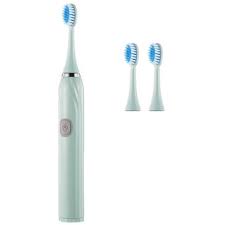If you care about your oral hygiene, here you will find the best electric toothbrushes on the market. Access the best prices, compare reviews, and discover with our reviews everything you need to know about achieving a professional clean for your mouth.
Still not using an electric toothbrush?

Have you wondered how many benefits you could get by making the switch? Let me show you some of the benefits of using an electric toothbrush:
- Superior cleaning: An electric toothbrush offers a more effective clean compared to manual brushes, thanks to its vibration or rotation technology that helps remove plaque more efficiently.
- Better oral health: With its more powerful cleaning action, an electric toothbrush reduces plaque buildup, lowering the risk of cavities, gum disease, and bad breath.
- Gentle care: Many electric brushes feature soft and gentle bristles that protect your gums and prevent unnecessary damage to your enamel.
- Access to hard-to-reach areas: Electric toothbrush heads are designed to reach difficult areas, such as interdental spaces and the back of the mouth, providing a more complete and even clean.
- Built-in timer: Most electric toothbrushes have a timer to ensure you brush your teeth for the dentist-recommended time, typically two minutes, helping maintain a proper brushing routine.
- Convenient experience: With an electric toothbrush, you only need to gently guide it along your teeth, allowing the brush to do most of the work. This is especially useful for people with manual dexterity issues.
Can you imagine how your oral health and dental care routine would improve with an electric toothbrush? Don’t miss the opportunity to enjoy these benefits. Improve your oral hygiene and get an electric toothbrush today!
Types of Electric Toothbrushes
These portable brushes run on electricity and are grouped into three types:
Rotary Electric Toothbrushes
These brushes have circular heads that rotate back and forth to clean each tooth. Some combine rotations with vibrations to remove more plaque.
Sonic Electric Toothbrushes
These have heads that vibrate the bristles side-to-side at high speeds. Some brushes vibrate fast enough to generate a buzzing sound that is audible. You can find brushes on the market that generate frequencies over 60,000 movements per second.
Ultrasonic Electric Toothbrushes
Ultrasonic brushes use a high-frequency ultrasound vibration to remove plaque and food particles. Ultrasound generates waves that are inaudible to the human ear, producing over 1.3 million movements per minute.
Advantages and Disadvantages of Using Electric Toothbrushes
Keeping your mouth clean and free of bacteria is undoubtedly the biggest benefit of using an electric toothbrush. Below are all the advantages and disadvantages of these devices:
✅ Advantages
- More effective at reducing plaque and gingivitis than manual toothbrushes.
- Helps whiten teeth thanks to the vibrations they generate.
- Doesn’t need to be replaced as often as manual toothbrushes, just the brush head needs changing.
❌ Disadvantages
- Much more expensive than a traditional toothbrush.
- Takes up more space than a normal brush.
- Since it runs on a battery, it needs recharging for continued use.
How to Decide Which Electric Toothbrush to Buy
Several factors should be considered before buying an electric toothbrush:
- Movement
It can be rotary, sonic, or ultrasonic.
- Brush heads
Brush heads should be replaced every three months, so before purchasing, you should check their prices and find the ones that fit your budget.
- Rechargeable or Battery-Powered
You should consider if you’re willing to make the extra expense of buying a battery-powered brush or just wait for a rechargeable one.
- Pressure Sensor
Some brushes detect if you’re applying too much pressure while brushing, potentially damaging your gums. Some brushes vibrate, slow down, or alert you with a built-in light.
- Timer
Using the brush for two minutes is recommended. Some models have a timer to notify you when you’ve finished cleaning.
- Position Sensor
There are models that detect brushing position, ensuring no area is left unbrushed.
- Connectivity
Some models feature Bluetooth connectivity, allowing you to connect the brush to your phone via an app that tracks your cleaning habits.
Are There Any Alternatives to Electric Toothbrushes?
Electric toothbrushes are an excellent alternative for a deep at-home mouth cleaning. There are two alternatives: a manual brush or visiting the dentist for a professional electric toothbrush cleaning. The first alternative doesn’t remove plaque as effectively as an electric toothbrush. The second alternative provides a deeper clean but comes with a higher cost.
The best thing you can do is take your time to choose the model that best fits your budget and meets your needs.
Some FAQs About Electric Toothbrushes
- What is the difference between an electric and a manual toothbrush?
An electric toothbrush has automatic bristle movements, which provide a more efficient and thorough clean compared to a manual brush.
- Are electric toothbrushes safe to use?
Yes, electric toothbrushes are safe as long as they are used according to the manufacturer’s instructions and you avoid applying too much pressure when brushing.
- How long does the battery of an electric toothbrush last?
Battery life varies by model, but most offer several days of use before needing to be recharged.
- Is it necessary to replace the head of an electric toothbrush?
Yes, it is recommended to replace the electric toothbrush head every 3 months or as directed by the manufacturer to maintain optimal cleaning and prevent bacteria buildup.
- Are electric toothbrushes suitable for people with sensitive gums?
Yes, many electric toothbrushes offer gentle brushing modes specifically designed for people with sensitive gums.
- Can I use an electric toothbrush if I have braces or dental appliances?
Yes, there are electric toothbrushes specifically designed for people with braces or dental appliances, making it easier to clean around them.
- Are electric toothbrushes recommended for children?
Yes, there are electric toothbrushes designed specifically for children, with features and brush heads adapted to their oral care needs.
- What is the difference between oscillation and rotation in an electric toothbrush?
Oscillation refers to the side-to-side movement of the bristles, while rotation involves a full turn. Some brushes combine both movements for a more comprehensive clean.
- Can I use regular toothpaste with an electric toothbrush?
Yes, you can use regular toothpaste with an electric toothbrush. Just be sure to apply the recommended amount and follow the manufacturer’s instructions.
- Can I use an electric toothbrush in the shower?
Some models are designed to be water-resistant and can be used in the shower. Check the manufacturer’s specifications to confirm your brush’s water resistance.
- Can I share an electric toothbrush with someone else?
Sharing an electric toothbrush is not recommended, as it can transfer bacteria and compromise oral hygiene. Each person should have their own brush head.
- Are electric toothbrushes noisy?
Some electric toothbrushes may produce a slight noise due to their vibration mechanisms, but generally, they are quite quiet.
- Can electric toothbrushes be taken on trips?
Yes, most electric toothbrushes are portable and come with travel cases for easy transportation.
- Can I use an electric toothbrush if I have dental implants?
Yes, electric toothbrushes are safe and effective for cleaning around dental implants, as long as they are used gently.
- What is the average cost of an electric toothbrush?
Electric toothbrush costs vary by brand and features. Generally, quality options can be found starting from $30 up to over $100, depending on the model and additional functions.
